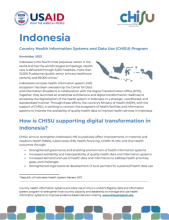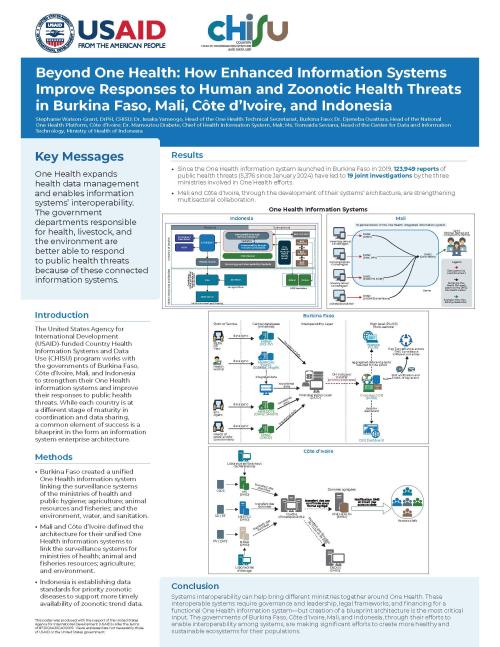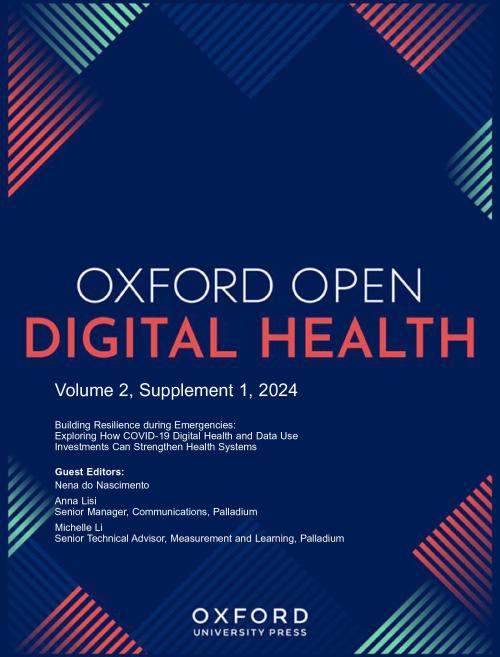Indonesia
CHISU aims to strengthen Indonesia’s HIS to positively effect improvements in maternal and newborn health (MNH), tuberculosis (TB), interoperability and data exchange, COVID-19, and health financing outcomes through:
- Strengthened governance and enabling environment of health information systems
- Increased availability and interoperability of quality health data and information systems
- Increased demand and use of health data and information to address health priorities, gaps, and challenges
- Strengthened organizational development of local partners for sustained health data use
Strengthening HIS and progressing digital transformation in Indonesia
Indonesia has invested in the use of digital tools to support health services for many years, but data exchange, systems data analytics, and coordination between stakeholders have not been prioritized. This has resulted in the development and use of over 400 individual information systems for health programs, contributing to a heavy burden on health workers to manage these systems.
To remedy this issue, Pusdatin and DTO initiated a digital health transformation. CHISU is supporting Pusdatin and DTO to realize this transformation through the institutionalization of best practices and processes for continuous HIS improvements at the national and subnational levels in an effort to impact MNH, TB, COVID-19, and health financing outcomes. To foster good governance, CHISU has supported the MOH to establish an HIS Technical Working Group (TWG) and assess the country’s digital maturity. This HIS TWG brings together the HIS ecosystem and MNH, TB, COVID-19, and health financing stakeholders to provide input on the digital health transformation.
To realize the vision of health information exchange, CHISU is supporting the rollout of SATUSEHAT (a health information exchange and data analysis platform), including the development of MNH, TB, COVID-19, and health financing data mapping, standards, and mechanisms for interoperability to streamline information systems to reduce data entry burden on health workers and improve access to quality data. To ensure this data is used for decision making, CHISU is training and mentoring MNH, TB, COVID-19, and health financing stakeholders on use of digital tools for data analytics, working to improve data quality, and exploring use of artificial intelligence on TB drug forecasting for data-driven decision making. CHISU is also engaging a local partner for institutional transition of CHISU’s technical support practices and expertise.
Based on these inputs, CHISU expects to impact quality of services by interoperating or integrating MNH, TB, COVID-19, and health financing information systems to reduce data entry burden and improve access to quality data for those on the front line of care. Soon, CHISU will be expanding these efforts to support HIV services and One Health surveillance and response, as well as the community health workforce. By ensuring facility- and community-based health workers can focus their workload on health services, and that they have access to comprehensive quality data, they will be better equipped to improve health outcomes for Indonesians.

Activity Updates
CHISU is partnering with the Indonesian Ministry of Health to standardize data exchange for interoperable health information systems that can seamlessly exchange data. Read more ›
Blog Posts
Collecting and using health information is an important part of health workers’ jobs. While we have made great strides in moving from paper-based records to digital health information systems, data that both health workers and policy makers need is often scattered across multiple information systems that cannot “talk” to each other. This means that health workers have to spend more time entering and finding data in multiple places and results in an incomplete view of both patient and community health. Read more ›
News
CHISU advances cost-effective maternal and neonatal programming in Indonesia with data
CHISU Indonesia partners with the Ministry of Health to train staff on cost-effective analysis to improve resource allocation. Read more ›
Resources

CHISU presented this poster on our one health work in Burkina Faso, Mali, Côte d’Ivoire, and Indonesia at the World One Health Congress in September 2024.

There is limited research on how emergency investments can support national health information system strengthening both for a given health emergency response and for routine health program areas.